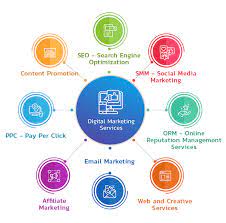The Power of Digital Content Marketing Strategy
In today’s digital age, having a robust content marketing strategy is essential for businesses looking to thrive in the online landscape. Digital content marketing involves creating and distributing valuable, relevant, and consistent content to attract and retain a clearly defined audience. Here’s why it’s crucial for success:
Building Brand Awareness
By creating engaging and informative content that resonates with your target audience, you can increase brand visibility and awareness. Consistent delivery of high-quality content helps establish your brand as an authority in your industry.
Driving Traffic and Engagement
A well-crafted digital content marketing strategy can drive organic traffic to your website and social media channels. By providing valuable information that addresses the needs and interests of your audience, you can boost engagement and encourage interactions with your brand.
Generating Leads and Conversions
Effective content marketing can nurture leads through the sales funnel by providing relevant information at each stage of the buyer’s journey. By offering valuable resources such as e-books, whitepapers, or webinars, you can capture leads and convert them into loyal customers.
Enhancing SEO Performance
Creating SEO-optimised content is key to improving your search engine rankings and driving organic traffic to your website. By incorporating relevant keywords, meta tags, and high-quality backlinks into your content strategy, you can boost your online visibility and reach a wider audience.
Measuring Success with Analytics
Analytical tools allow you to track the performance of your digital content marketing efforts in real-time. By monitoring key metrics such as website traffic, engagement rates, conversion rates, and social media interactions, you can identify what works best for your audience and make data-driven decisions to optimise your strategy.
Conclusion
A well-planned digital content marketing strategy is a powerful tool for businesses seeking to connect with their target audience in today’s competitive digital landscape. By creating valuable content that resonates with users across various online platforms, businesses can enhance brand visibility, drive traffic, generate leads, improve SEO performance, and ultimately achieve their marketing goals.
Seven Key Benefits of a Digital Content Marketing Strategy for Boosting Brand Success
- Increases brand visibility and awareness.
- Drives organic traffic to websites and social media channels.
- Nurtures leads through the sales funnel.
- Improves search engine rankings with SEO-optimised content.
- Enhances audience engagement and interactions with the brand.
- Provides valuable insights through real-time analytics.
- Helps establish brand authority and credibility in the industry.
Challenges in Digital Content Marketing Strategy: Navigating Saturation, Costs, and Competition
- 1. Saturation
- 2. Time-Consuming
- 3. Costly
- 4. Rapid Changes
- 5. Content Fatigue
- 6. Measurement Complexities
- 7. Competition for Attention
Increases brand visibility and awareness.
One significant advantage of implementing a digital content marketing strategy is its ability to enhance brand visibility and awareness. By consistently producing engaging and relevant content tailored to the target audience, businesses can effectively showcase their brand identity and values across various online platforms. This increased visibility not only helps in capturing the attention of potential customers but also establishes the brand as a credible authority in its industry, ultimately leading to greater recognition and trust among consumers.
Drives organic traffic to websites and social media channels.
One significant advantage of implementing a digital content marketing strategy is its ability to drive organic traffic to websites and social media channels. By creating valuable and relevant content that resonates with the target audience, businesses can attract users who are genuinely interested in their offerings. This organic traffic not only increases visibility but also enhances engagement, leading to a higher likelihood of conversions and building a loyal customer base over time.
Nurtures leads through the sales funnel.
One significant advantage of a digital content marketing strategy is its ability to nurture leads through the sales funnel. By providing valuable and relevant content at each stage of the buyer’s journey, businesses can guide potential customers from initial awareness to final conversion. This process helps build trust, establish credibility, and address the specific needs and concerns of prospects, ultimately increasing the likelihood of turning leads into loyal customers.
Improves search engine rankings with SEO-optimised content.
One of the key advantages of implementing a digital content marketing strategy is its ability to enhance search engine rankings through SEO-optimised content. By carefully crafting content that incorporates relevant keywords, meta tags, and high-quality backlinks, businesses can significantly improve their online visibility and attract more organic traffic to their websites. This proactive approach to SEO not only helps websites rank higher in search engine results pages but also ensures that the content resonates with both users and search engine algorithms, ultimately driving long-term success in the competitive online landscape.
Enhances audience engagement and interactions with the brand.
One of the key advantages of a digital content marketing strategy is its ability to enhance audience engagement and interactions with the brand. By creating compelling and relevant content that resonates with the target audience, businesses can foster meaningful connections with their customers. Through interactive elements, social media campaigns, and personalised messaging, brands can encourage active participation, feedback, and dialogue, ultimately building a loyal community of engaged followers who feel connected to the brand on a deeper level.
Provides valuable insights through real-time analytics.
One significant advantage of implementing a digital content marketing strategy is the ability to gain valuable insights through real-time analytics. By utilising analytical tools, businesses can track and monitor the performance of their content in real time, allowing them to understand audience behaviour, engagement levels, and conversion rates. This data-driven approach enables businesses to make informed decisions, refine their strategies, and optimise content to better resonate with their target audience, ultimately leading to more effective and successful marketing campaigns.
Helps establish brand authority and credibility in the industry.
In the realm of digital content marketing strategy, one significant advantage is its ability to help establish brand authority and credibility within the industry. By consistently producing and sharing valuable and relevant content that showcases expertise, insights, and thought leadership, businesses can position themselves as trusted sources of information. This not only enhances brand reputation but also instils confidence in customers, ultimately leading to increased trust, loyalty, and recognition in the competitive market landscape.
1. Saturation
In the realm of digital content marketing strategy, a significant con that businesses often face is saturation. The online landscape is overflowing with a vast amount of content, making it increasingly difficult for brands to distinguish themselves and capture the attention of their target audience amidst fierce competition. Standing out in a crowded digital space requires innovative approaches and exceptional creativity to ensure that your content not only reaches but also resonates with your audience in a meaningful way.
2. Time-Consuming
One significant drawback of implementing a digital content marketing strategy is the time-consuming nature of the process. Crafting compelling and valuable content that resonates with the target audience, coupled with the need to adhere to a regular posting schedule, demands a considerable investment of time and effort. This can pose challenges for businesses aiming to balance content creation with other operational priorities, potentially leading to delays in content delivery and impacting overall marketing effectiveness.
3. Costly
One significant drawback of digital content marketing strategy is its high cost. To effectively implement a successful strategy, businesses often need to invest in professional content creation, SEO services, and paid promotions, which can result in substantial expenses. From hiring skilled writers and designers to running targeted advertising campaigns, the financial commitment required for these elements of digital content marketing can be a barrier for smaller businesses with limited budgets. The ongoing costs associated with maintaining a competitive online presence through quality content and strategic promotions can add up over time, making it a costly endeavour for some organisations.
4. Rapid Changes
In the realm of digital content marketing strategy, one significant drawback is the rapid pace of change. Digital trends and algorithms evolve swiftly, demanding constant adjustments to stay relevant and effective. Keeping up with these dynamic shifts can be challenging, as audience preferences and online platforms continuously adapt. This necessitates a proactive approach to monitoring and adapting strategies to ensure they align with the latest trends and algorithms, posing a continuous challenge for marketers aiming to maintain a competitive edge in the digital landscape.
5. Content Fatigue
In the realm of digital content marketing strategy, one significant drawback to be wary of is content fatigue. When businesses inundate their audiences with an overwhelming amount of content, there is a risk of saturating their attention and causing disengagement from the brand. This oversaturation can lead to audience members feeling overwhelmed, losing interest in the content being presented, and ultimately disconnecting from the brand’s messaging. It is crucial for businesses to strike a balance between providing valuable content and avoiding overwhelming their audience to maintain engagement and prevent content fatigue.
6. Measurement Complexities
Analysing the effectiveness of digital content marketing strategies can pose a significant challenge due to the complexities of measurement. With a plethora of metrics and data points available, ranging from website traffic and engagement rates to conversion rates and social media interactions, navigating through this vast amount of data can be overwhelming. Determining which metrics are most relevant and how they interplay with each other to gauge the success of a campaign requires careful consideration and expertise. This complexity in measurement can sometimes lead to difficulties in accurately assessing the true impact and ROI of digital content marketing efforts.
7. Competition for Attention
In the realm of digital content marketing strategy, one significant drawback is the intense competition for attention. In an overcrowded online space where countless brands are constantly vying for consumer engagement, standing out and capturing the audience’s interest can prove to be a daunting task. Breaking through the cacophony of information and stimuli to effectively reach and resonate with target audiences poses a considerable challenge for businesses aiming to make their mark in the digital sphere.




